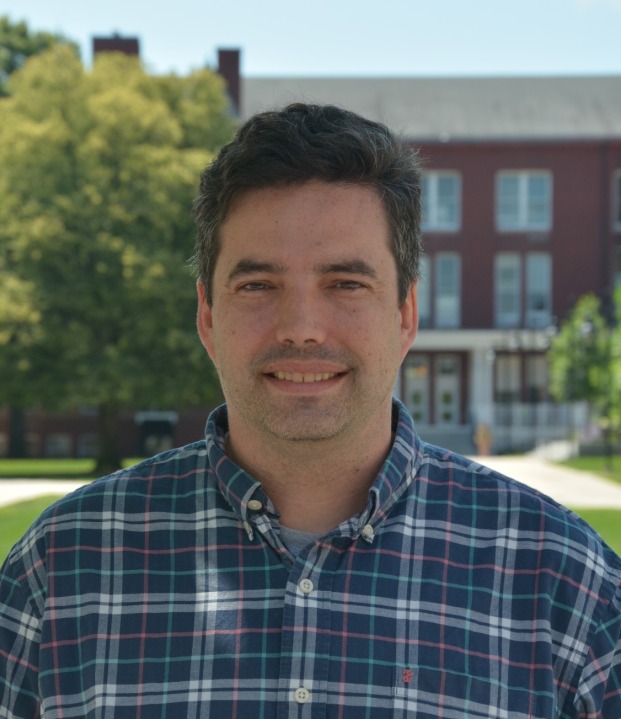Faculty Spotlight: Eric Williams

Dr. Eric Williams (he, his, him) came to Fitchburg State’s Biology & Chemistry Department in 2017. As Assistant Professor of Biology, Eric teaches courses such as Anatomy & Physiology, Developmental Biology, Neuroscience, and Cancer Genomics. He also works with a talented group of undergraduate researchers in Biology, whose work is focused researching therapies for a rare type of muscular dystrophy.
Eric grew up in Salem, NH, where he had an inspiring high school biology teacher (Michael Courtois) that encouraged him to pursue a career in biomedical sciences. He studied genetics and developmental biology at Cornell University and graduated with a Bachelor of Arts in 1999. After graduation, he spent four years working as a research technician. He first worked in a lab at Brigham Women’s Hospital that focused on polycystic kidney disease- a common disease that affects 12.5 million people worldwide. The lab developed the first mouse model of the disease which was later used to test an FDA-approved treatment for the disease: Tolvaptan.
He later worked in a lab at Massachusetts General Hospital that focused on Amyotrophic Lateral Sclerosis (ALS). ALS is a disease that affects the nervous system’s ability to control voluntary movement. The lab was interested in the molecular mechanisms of Riluzole-the only drug available to patients with the disease.
In 2003, Eric went back to Cornell University to get his Ph.D. in neurobiology and behavior. The topic for his thesis was olfaction (the sense of smell). Olfactory neurons are unique in that they are continually replaced throughout a person’s lifetime. In fact, a person’s olfactory neurons are replaced every two months. Eric’s thesis focused on the mechanism that olfactory neurons use as they continually find their targets in the brain. His research findings have implications for neurodevelopmental disorders that affect neuronal wiring.
Eric did his postdoctoral work at an anti-aging lab at MIT. He received an American Cancer Society fellowship to study the effects of anti-aging interventions on skin cancer. It turns out that calorie restriction can increase lifespan and decrease cancer. The goal of Eric’s work was to activate the genes underlying calorie restriction so that a person could enjoy the health benefits without undergoing the uncomfortable process of calorie restriction itself. Check out some of Eric's research work in this 2019 article in the journal Aging Cell.
Eric’s current muscular dystrophy work is a continuation of a project that began when he was a research scientist at MIT. His students use a number of interesting research models to study the disease. One of these is a microscopic nematode that becomes infertile when it has the disease-causing gene. The goal of the research model is to “cure” the infertility of the worm and then apply that knowledge to the human disease. The group also uses stem cells to create muscles in petri dishes. The students who work with Eric have presented their findings at the Fitchburg Undergraduate Research Conference, the University of Massachusetts Undergraduate Research Conference, and also to a research group at MIT.
Eric lives in Groton, MA and enjoys spending time with his wife Cynthia, his daughter Beth (age 4), and his son Leo (age 2). Their family enjoys sledding, going to the beach, and going on walks with their dog Roxy. Eric is an aspiring apiarist, but he has yet to obtain a bee hive or for that matter, gotten close enough to even touch a bee.
